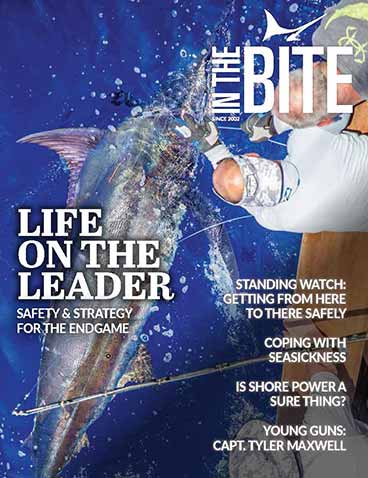
“Forever grateful. Aged just seventeen, Newt Cagle left his South Carolina home of Sullivan Island. On Captain John Mumford Hattitude, he was en route to all the usual new mate, cut-your-teeth destinations. The standard travel circuit seems to continually spit out the good new mates, and swallow up the bad: Florida, Mexico, Bahamas, Dominican Republic and St. Thomas. If you can survive the nighttime antics of this billfish boot camp, youre usually good. If not, youre on the first plane home to grow up. Fast-forward 11 years and Cagle, having never fished South Carolina as captain before, came home to win the 2017 Carolina Billfish Classic in Charleston as captain of the 57-foot Dean Johnson, Toast. The win was extremely special to us, particularly, says Capt. Newt, speaking of his mate, Jimbo Brogan and himself. Both of our fathers were fishing with us. A survivor, Newt feels full: lucky and fortunate. The first time I met Cagle was in the Bahamas a few years ago. Reserved yet present, Newt seems to have an air of quietness to him¦an ease, if you will. A contentment that comes from knowing your place in the world, knowing youre a fisherman have been and always will be. Newt has never known anything but, admittedly. More than that he never considered anything else as a career. Why would he? Groomed by his father John Cagle and uncle, Peter Dubose, Newt has felt privileged to have grown up fishy. But coming from a boat-owning family is not always the best recipe for respect in this industry, Newt says. Working extra hard to make head-way in the respect department, Cagle feels he cant, even for a minute, slack off. His predecessors eyes are on him, and the lessons learned as a Gen Y junior on the Hattitude years ago are paying off. Cagle finds it nearly impossible to list all who have molded him into a tournament-winning young gun. So many have taught me to be a better captain and a better person. He continues, It very hard to name them all. But I am, and always will be, indebted to the guys who have and continue to shape me into a leader. Modern-day legends like John Mumford, James Ewing, Terry Robinson, Ronnie Fields and Butch Cox are some of the gentlemen Cagle speaks of and considers to be his driving influences. Cagle strives to remember what they taught him and apply that knowledge to his own real-world situations. Cultivating his decade-long relationships in this business have allowed Newt the opportunity to turn knowledge into experience. Whether it a simple problem or a tip, he believes that the information you give is only as sound as the captain(s) youve learned it from. Another aspect of Cagle perspective: if you miss the cockpit on the way to the bridge, that inexperience will eventually show through. A definitive example of how you cant get to Point B without going to Point A first. Even though Captain Newt Cagle is one of the youngest of guns, his head is in the game and he fully understands the repercussions and reserves a young captain may face. There are a lot of gray areas that require judgment-based decisions that can affect a lot of people, he says. And because there is no textbook or SOP in this business, it all comes down to your ability to make a mature decision and many times it not the most ˜fun choice. Cagle declares there is a time and place for everything, and your success behind the wheel depends on what you were taught in the past, and how you harness that education in the future. To have the proper teachers ones you likely mimic in your own program will turn an ordinary young captain into an extraordinary one, he says, and working under the right captain(s), you learn the importance of not only safeguarding a thriving program but eagerly going above and beyond to keep it there. In order to be a good captain, you have to work for a great one, says Cagle. And Im lucky to have worked for some of the best. Captain Newt Cagle sees the big picture, given his young age, and firmly stands behind the fact that you must, as he puts it, Be mature enough to know that you are ultimately responsible for everything that happens. By being an organized, mechanically-inclined communicator, Captain Newt feels he has paid his dues to this sportfish-society and wants nothing more than to be, Well-rounded and competitive everywhere I go. With his village standing beside him, Newt bumpy road seems most tolerable. Without our parents, owners, captains and mates, we are nowhere. They all have opened different doors for me, and at the end of the day, Im nothing without them.












